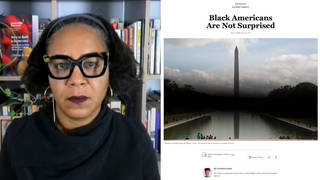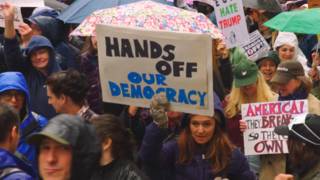
Guests
- Laura Flandershost of GritTV.
- Richard Kimsenior editor at The Nation and co-editor of the anthology Going Rouge: Sarah Palin, An American Nightmare.
- John NicholsWashington correspondent for The Nation.
- David GoodmanVermont-based journalist and author.
The midterm elections saw two key Senate victories for the Tea Party and major losses for the right-leaning Blue Dog Democrats. Meanwhile, the Senate lost one of its most progressive lawmakers with the ouster of Democrat Russ Feingold of Wisconsin. We get analysis from four guests: Laura Flanders, host of GritTV; Richard Kim, senior editor at The Nation magazine; John Nichols of The Nation magazine; and Vermont-based journalist and author David Goodman. [includes rush transcript]
Transcript
AMY GOODMAN: I’m joined for more on these midterm elections by three guests. Laura Flanders is the host of GritTV. Richard Kim is senior editor at The Nation magazine. And John Nichols is the Washington correspondent for The Nation magazine.
I want to start with the tea party. Richard Kim, talk about the wins, the losses, and what this means.
RICHARD KIM: So, you know, the tea party did have some considerable wins last night. You saw Marco Rubio winning by pretty big margins in Florida. It also had some losses, and those were the most extreme elements of the tea party — Christine O’Donnell, Sharron Angle. It looks like Joe Miller will probably lose in Alaska. So, you know, they are responsible for, I would say, about half, you know, really, of the Republican gains.
The narrative out of last night, though, was that this was a huge tea party tidal wave, and that was what Marco Rubio and Rand Paul tried to set in their speeches, in their acceptance speeches. And even John Boehner said, you know, “We will reward you, we will remember the tea party.” So, going forward, they are going to be very aggressive about pursuing their legislative agenda, which is the repeal of everything, basically. The repeal of the twentieth century, basically. And it’s a big question of whether sane Republicans will sort of step in there and say, “You know, you guys were responsible for some, but not all, of our victories. And the country is not where you are, actually.” That’s the result, really, from last night.
AMY GOODMAN: John Nichols, the analysis of the tea party and what they meant for the Republican Party?
JOHN NICHOLS: Sure, look, the tea party is the best news that the Democrats had last night, because if Christine O’Donnell, Ken Buck and Joe Miller had not defeated the candidates that the Republicans in Washington wanted, those candidates almost certainly would have won Senate seats, and we would be looking now at a Republican majority in the Senate. So while the tea party brought energy and some fresh and electable candidates in some states, in other states, particularly in your more moderate states, your swing states, the tea party actually brought the only candidates who could lose on Tuesday, and they did.
AMY GOODMAN: Laura, you have edited a book, At the Tea Party: The Wing Nuts, Whack Jobs and Whitey-Whiteness of the New Republican Right..And Why We Should Take It Seriously.
LAURA FLANDERS: Well, I think it’s important to look at who the tea party are, what the tea party is. I mean, let’s remember, it’s many different organizations. They wouldn’t be there if it hadn’t been for an enormous amount of money from a few — well, Simon Johnson calls them the “13 bankers.” The Wall Street world that Barack Obama told, “I’m the only thing that stands between you and the pitchforks,” turned around, and for all the compromising that Barack Obama did to Wall Street and to the banksters who had brought us the crisis that he inherited when he was elected president, they turned around and poured money into the organizations that we think of as the tea party. Other the people, as well, but, you know, $75 million from the US Chamber of Commerce, most of it, almost all of it, anonymous money. American Crossroads, Crossroads GPS, these outside groups funded by Karl Rove. Fred Malek, the old “Jew counter” from the Nixon era, the guy who went and counted how many Jews were in the Bureau of Labor Statistics, his organization, another $6 million.
So, while the story in many parts of the media is of this people power, up-from-below movement that has shocked the Republican Party and the country, I think the reality is much more that they were in many ways a front for a profit movement in a period where we have more concentrated wealth than ever before. In eighty years we’ve never seen anything like this. And that money went directly into reversing the gains of any kind of Obama, “we the people” kind of movement from 2008. And they started right away. And I think this wasn’t the beginning of something; this was really — well, I call it the, thinking of Glenn Beck, the “Beckhanal.” This was sort of the orgiastic, irrational celebration of really thirty years of investment by the right. Has a little bit of a new face, a new media machine behind it — and in front of it, in some cases — but it is a culmination of something. My optimistic self says, OK, well, after a culmination of something, doesn’t there have to be a reverse back in another direction or a movement forward in a new place?
AMY GOODMAN: And I think we also have to talk about where that money goes —- $4 billion, unprecedented for midterm elections, though it wasn’t unprecedented for the presidential election a few years ago. But that -—
JOHN NICHOLS: No, it actually is unprecedented. Let’s be clear. This election will cost the better part of a billion dollars more than the presidential election. And there’s substantial evidence that this is going to be the most expensive election in American history. It could well get well above $4 billion. And the important thing to understand is that that money didn’t just play in the races that we all talk about. It didn’t just play in Senate races and in some congressional races. Karl Rove, in the final days, put a million dollars into California to beat an attorney general candidate who he thought was attractive as a future contender.
RICHARD KIM: Right.
LAURA FLANDERS: And when you’ve got — I mean, one of the frustrations in all of our worlds, I think, is the lack of media interest in this money story.
JOHN NICHOLS: It’s not being covered.
LAURA FLANDERS: This campaign crash — I mean, cash story. You had independent media covering it.
JOHN NICHOLS: Mm-hmm.
LAURA FLANDERS: But, you know, Rand Paul, for him to get up and say he’s the people’s candidate, against the bankers, against the elite, he had $180,000 of Wall Street money, according to the Center for Responsive Politics.
RICHARD KIM: Well, the most covered person in this election cycle was Christine O’Donnell, actually.
JOHN NICHOLS: Yeah.
RICHARD KIM: By far. She had the news hits. She had the most mentions on blogs. So, you know, there you have a sense of what the media was actually focused on: a candidate who was going to go down by ten percentage points. But on the money end, you know, this is just like the opening act of 2012.
JOHN NICHOLS: Oh, in fact, they have said it.
RICHARD KIM: Exactly.
JOHN NICHOLS: They have said it. They had a meeting two weeks ago, where they brought together all of these former Republican consultants, everybody who’s running one of these giant new independent PACs or groupings. They brought them together, and they said, “OK, we’ve won already. We’ve won 2010. Do we want to continue?” And Karl Rove and these others announced, yes. These are not going to be what we initially thought, a one-year project to tamp down Obama. They’re going into 2012, and they will go in with dramatically more money than they spent this year.
LAURA FLANDERS: It is interesting. I mean, for the At the Tea Party book, which is available exclusively from OR Books, people — you have to go to orbooks.com; we’re not dealing with bookstores and Amazon and all the rest — I attended some tea party meetings right here in New York. And I saw what was originally a very small kind of gathering of fairly disjointed, unhappy folks who had time on their hands — most of them were unemployed — with a variety, a huge diversity, of pet peeves, from guns to abortion to you name it. In about July of this summer, suddenly there were tens of thousands of dollars that they could get from Americans for Prosperity, the David Koch and the Koch brother-funded organization, so that what had been, you know, essentially twenty people meeting in a room to try to back a candidate who would go against the — well, go against Chuck Schumer, at that point, for Senate in New York, it became much more than that, with a very vibrant email operation and a real sense of relationship to other tea party groups around the country. And that was thanks to $20,000 pushed in from outside.
RICHARD KIM: You saw the opposite with Tea Party Patriots, which is the most grassroots of the tea party groups.
JOHN NICHOLS: Yeah, yeah, the real guys, the real ones, yeah.
RICHARD KIM: The Washington Post went to try and find the thousands of Tea Party Patriots groups, but they could only find 600, many of whom which were like two guys in a living room, right? So that was not Koch brothers-funded and grassroots, and it actually shriveled over the past few months.
JOHN NICHOLS: Oh, well, let’s understand something else, too. Americans for Prosperity, this is — you know, what you’re talking about is New York. They came into New York late, because, frankly, you had this — you had places to go. The opportunities appeared. But the places where they wanted to win, they were in a year ago. They were in in April and May of 2009.
And the fascinating thing was, I went to some of the first tea party rallies. And I go to rallies a lot — usually, our side, and, you know, you’ve got somebody yelling as loud as they can to be heard. At the tea party rallies, they had big screen TVs, they had, you know, cameramen on the stage, you know, so they could shoot the speakers from different angles. We’re talking rallies in local communities around the country that had to cost $15,000, $20,000. That’s not a grassroots movement.
AMY GOODMAN: I wanted to ask you, John Nichols, about Russ Feingold.
JOHN NICHOLS: Yes.
AMY GOODMAN: The National Journal writes, “The scope of the Democratic devastation is perhaps most evident in Wisconsin. […] Democratic Sen. Russ Feingold was ousted by Republican Ron Johnson. Democrats lost two seats in the House and control of both […] chambers of the state legislature.”
JOHN NICHOLS: Mm-hmm, mm-hmm, mm-hmm. Yeah, it was a devastating result. And, you know, look, we can sum it up a lot of ways. First off, we ought to explain that we’ve lost the one senator who voted against the PATRIOT Act, the one senator who voted against every free trade deal.
AMY GOODMAN: The Democratic senator.
JOHN NICHOLS: No, no Republican voted against the PATRIOT Act in the Senate. But the one who voted against every free trade deal, because it was bad for workers and farmers, the one who voted against going to war in Iraq and then was the first to ask for a time line to get out of Iraq, the first to ask for a time line to get out of Afghanistan, and the one who said that Bush should be censured for warrantless wiretapping.
LAURA FLANDERS: And the one who opposed the bank bailout and voted against —
JOHN NICHOLS: And voted against Geithner.
LAURA FLANDERS: — confirmation of Tim Geithner.
JOHN NICHOLS: And the only Democrat who voted against the bank reform bill, because he said it didn’t really do what needed to be done. So we have lost a pretty remarkable player.
And you ask yourself, how can that happen? Well, the fundamental reality is, in Wisconsin — I’m going to sum it up — in the night of the last US Senate debate, when Russ Feingold and his millionaire opponent were debating for an hour, the news story in Wisconsin was not the debate. It was that the last auto plant in Wisconsin closed that day, the Kenosha Chrysler engine plant. And so, they had this video of a factory closing. Now, it happened that Russ Feingold spent his entire career trying to keep that factory open, but that factory was closing on Barack Obama’s watch, on the Democrats’ watch. And frankly, I think that it’s not just Feingold. You go right over into Illinois, you see Phil Hare, a former union leader and absolute stalwart defender of working-class people, who voted against the President on a number of issues, went down, got beat, because I think that the national narrative was, Obama gets elected, he’s supposed to stand up for workers and farmers, and he didn’t, so we’re going to switch. And it did happen in a lot of states.
LAURA FLANDERS: But the question then becomes, you know, what happens next? I mean —
JOHN NICHOLS: Yes.
LAURA FLANDERS: — in many ways — and somebody used a great phrase describing Glenn Beck, one of the sort of media motivators for the tea party movements — he’s the false prophet of profit, you know. And that’s absolutely true, I think. There’s certainly racist, as I say, wing nuts, whack jobs and whitey-whiteness in this movement, but there are also people who have been vulnerable to the message: Obama’s not looking after the regular guy; we’ll look after the regular guy. Again, without a media that will say, “That’s no regular guy” — you know, Ron Johnson is not a regular guy.
JOHN NICHOLS: He’s a millionaire.
AMY GOODMAN: Talk about who Ron Johnson is.
LAURA FLANDERS: A millionaire with $100,000 of BP stock.
JOHN NICHOLS: Well, this is the fascinating thing about Ron Johnson. Ron Johnson had never been involved in politics. He said that he got — he decided to run for the US Senate from watching Fox. And you actually had Dick Morris on saying, “Wow, Russ Feingold is vulnerable. Somebody ought to run against him.” And Ron Johnson, watching the show, said, “Oh, I’ll do it.” His entire economic training, as best we can tell, came from reading Ayn Rand. I’m not kidding. He says that in debates. He thinks sunspots cause global warming. I mean, this is a guy who’s way out there. And you say, “Well, why doesn’t the media stop this?”
AMY GOODMAN: And his wealth comes from?
JOHN NICHOLS: He married a wealthy woman.
RICHARD KIM: Spent $4 million just in the primary. And then the —
JOHN NICHOLS: Well, no, you’ve got to understand, he gave — somehow, out of this very small packaging company, he gave himself first one $5 million loan, then another $5 million loan. But really, this is the important thing, because it ties together all the stuff we’re talking about. He did put $10 million in upfront. But Karl Rove and a lot of these other people have wanted to get rid of Russ Feingold for a long time, because he’s the face of campaign finance reform. So that outside money came in in huge amounts.
And here’s the most fascinating — kind of the capper of the whole thing. On Tuesday, a day early, the Wall Street Journal wrote a dance-on-the-grave editorial with a drawing of Russ Feingold, saying, “Wow, we’re finally going to get rid of Russ Feingold!” The enthusiasm of that editorial — I encourage people to go back and read it — the enthusiasm of that editorial summed up really what was going on. Johnson spent a lot of his money, but literally millions, perhaps tens of millions, of dollars in corporate money came in to get rid of Russ Feingold.
LAURA FLANDERS: And it wasn’t just Feingold. The editorial talked about the death of campaign finance. The effort to restrict campaign contributions by corporations is dead, they said. This is the end of that liberal experiment.
AMY GOODMAN: I wanted to go to Vermont for a minute. Patrick Leahy, head of the Senate Judiciary Committee, easily won his race.
JOHN NICHOLS: An important win.
AMY GOODMAN: As well as Peter Welch, the single Congress member who had taken Bernie Sanders’ seat. Bernie Sanders was — is now the Independent senator from Vermont. But there is a heated race that has not been decided, and that is the race for governor. We’re joined right now by journalist David Goodman, who also happens to be my brother, speaking to us from Vermont.
David, what’s happening in Vermont right now? Why is this governor’s race so significant?
Let’s see if we can — David, are you there?
DAVID GOODMAN: Here.
JOHN NICHOLS: Oh, yeah, you got him.
AMY GOODMAN: Yeah, OK, why don’t you go through why this governor’s race is so important?
DAVID GOODMAN: There have been three key issues for — that have been debated here. One is Democrat Peter Shumlin is calling for single-payer health insurance, for Vermont to be kind of a laboratory for this to implement it in the country. The other is nuclear power. Vermont has one of the oldest nuclear power plants in the country, called Vermont Yankee. Its license expires in 2012, and Shumlin wants to shut it down. It’s a very unsafe plant that has had a number of leaks just this year alone. It would be the first state in the country to shut down a nuclear power plant. It’s one of the only states that has legislative authority over a nuke. The other was abortion. Republican Brian Dubie is anti-abortion. Shumlin has campaigned hard for the women’s vote and has said that he will fight to keep abortion safe and legal in the state. So those were three hot-button issues.
At this point, it looks like the election may be decided in the legislature. Vermont, if a candidate doesn’t clear 50 percent, it goes to the legislature. It is a Democratic-controlled legislature. So, if it is Shumlin who is ahead, it will probably not be a problem for him.
One of the interesting side notes, Shumlin, the Democratic frontrunner at this point, led the fight for — to legalize gay marriage in Vermont, of course the only state to legalize gay marriage by an act of the legislature, not the courts. An interesting political side note is that as Shumlin — the race was so tight, and Bernie Sanders, not a Democrat, an Independent, came sweeping in about ten days ago and began barnstorming around the state with Shumlin, an Independent senator leading the Democratic gubernatorial candidate to try and get him over the finish line. So it was quite an interesting spectacle.
AMY GOODMAN: Well, David, thanks for that report from Vermont. The Blue Dogs, half the Blue Dog Democrats went down. Talk about the significance of this, Richard Kim.
RICHARD KIM: Well, you know, some of the Blue Dogs actually — the Blue Dogs that got saved — you know, Heath Shuler, Mike McIntyre — are somewhat of an interesting picture. So, you know, Mike McIntyre, who’s this guy in North Carolina’s 7th District, he’s about as conservative as you can get. Not only did he vote against healthcare reform, he has an NRA endorsement, Chamber of Commerce endorsement. But he also thinks it’s OK to fire gay people just because they’re gay. And he came out in support of the Arizona immigration papers law, right? So this is a guy that really is pretty much a conservative Republican. The ads in his district: “Defeat the Pelosi-McIntyre agenda.” Those were the ads run by his opponent Ilario Pantano. And so, you really see what they had to run against. And that’s what happened to a lot of the Blue Dogs, is it doesn’t matter whether they voted against healthcare reform or for healthcare reform. They got tarred, you know, with this Obama-Pelosi brush.
JOHN NICHOLS: And that happened to people who were liberals, people who are moderates, people who are conservatives.
AMY GOODMAN: Just one quick thing. He defeated Ilario Pantano, very significant —
RICHARD KIM: He did. He did.
AMY GOODMAN: — the man who became famous for killing two Iraqi men, putting sixty bullets in them, and hanging a sign around them, and proudly talked about that.
LAURA FLANDERS: Although not famous enough. His opponent, the Democrat, didn’t talk about it.
JOHN NICHOLS: No, didn’t use it. No, because that —
LAURA FLANDERS: Didn’t go over him on it.
JOHN NICHOLS: He thought that might harm the political race. Look, but one of the things to understand about the losses of the Blue Dogs is they came — a lot of the Blue Dogs who lost were the people who actually believe in the Blue Dog agenda. The ones who won were sort of people who put Blue Dog — a lot them — in places like California, who put Blue Dog on their résumé because it looked good.
The truth of the matter is — this is the bottom line — the Blue Dog Caucus is done. It’s over. It’s gone. And that’s a relatively healthy thing. But what it also tells us is the Democratic Party as a viable force in the South is also pretty much done. We have to really take another look at that electoral map and understand that our politics is going to be very, very different in this country going forward.
AMY GOODMAN: And let’s just talk about the governors’ races, what they means for redistricting. We have ten seconds. Who wants to take this on?
JOHN NICHOLS: It’s a bloodbath. Look, the Republicans took at least nine governorships. Republicans have taken more than 500 legislative seats that they didn’t have. They’ve got the highest number of legislative chambers right now since before World War II. That’s going to be a big problem in redistricting.
AMY GOODMAN: We’re going to leave it there. Thank you very much, John Nichols and Richard Kim of The Nation magazine, Laura Flanders, host of GritTV. Her book is At the Tea Party. And that does it for today’s broadcast, the morning after.












Media Options